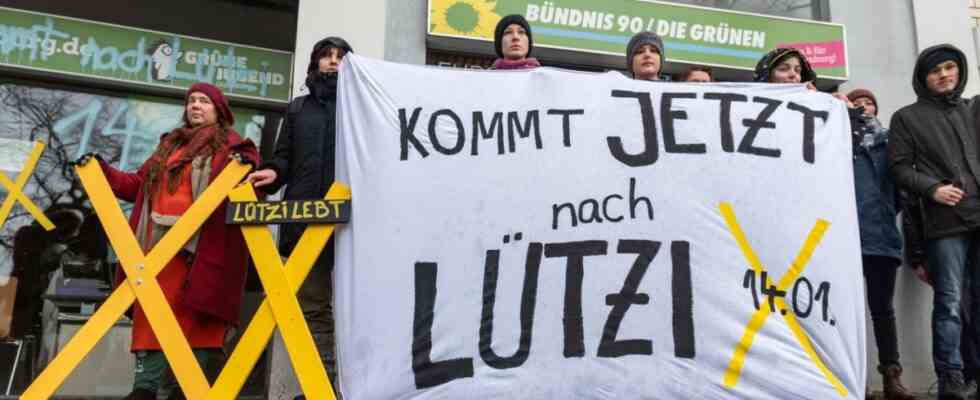You sense that the sinking is approaching. But they don’t want to give way. Day X has been in effect since Tuesday in the hamlet of Lützerath. Climate activists from “Fridays for Future” have launched a nationwide appeal to occupy the long-abandoned village. The excavators of the lignite opencast mine are already in sight. Around 200 young climate protectors are said to have holed up in courtyards and tree houses to prevent the village from being destroyed. “Lützi is defended,” announces “Fridays for Future”.
The Greens are also threatened with a kind of Day X. For years, the party fought with the activists to preserve the villages threatened by the Garzweiler II opencast lignite mine. Now, however, the police will be moving in to clear what the Green Federal Economics Minister Robert Habeck and his party colleague and North Rhine-Westphalian Economics Minister Mona Neubaur negotiated with the energy company RWE in the autumn: the end of opencast coal mining in the Rhenish Revier is being brought forward to 2030 , five villages are not demolished with excavators. But Lützerath still has to believe in it so that the current flows in the crisis.
It was a compromise of many over the past year. Extension of service life, more electricity from coal, new liquefied natural gas terminals: the Greens have taken decisions against their own principles in order to mitigate the consequences of the Ukraine war. Anger is growing among activists, especially in the Lützerath case. Luisa Neubauer, one of the main organizers of “Fridays for Future”, just vented her anger via Twitter. “The Greens are making a big mistake with this,” she warned, accusing the party of “calculated undermining of the Paris climate goals.” According to the report, the coal under Lützerath is not needed for energy security in the crisis.
Are the climate opponents even further alienated from the Greens?
You see it very differently in the party. Nevertheless, internal concerns are growing that the climate movement could become even more alienated from the Greens. One can govern with compromises, says a leading Green party. You just don’t win the voters’ hearts that way.
The former parliamentary group leader Anton Hofreiter openly expresses what many in his own party and parliamentary group now think. “I would wish that we would fight even harder on important issues,” says Hofreiter Süddeutsche Zeitung. “It’s not easy in a coalition with three different partners. However, compromises must not be at the expense of our livelihoods. When it comes to protecting our climate and biodiversity, we are simply running out of time.”
The party leadership wants to set an example at the beginning of the week. On Monday and Tuesday, the six-member party executive, headed by Ricarda Lang and Omid Nouripour, will hold a retreat in Berlin to discuss how the party can score more points with its own issues. The coalition has proven to be more capable of acting in the midst of the crisis than many previous governments in quieter times, says Emily Büning, political director of the party, the SZ. But she had “desired a little more focus on results and objectivity, especially from one of the coalition partners”. For example “more vigour, for example in achieving the climate goals in the transport sector”.
The Greens in the coalition now want to ensure this and decide this at the meeting at the beginning of the week. Büning demands that 2023 must become the “Climate Protection Year”. “It’s time to make the country more crisis-proof and sustainable in the long term.”
But it remains to be seen whether this will succeed. Because while the eco-party wants to accelerate the phase-out of coal in East Germany and convert mobility more quickly, the coalition partner FDP is hoping for completely different successes. Softened climate targets for the transport sector, for example. Or a renewed extension of the German nuclear lifespan. The battle for nuclear power in the coalition is likely to intensify before the reactors are finally shut down in mid-April.
The disputes have not harmed the Greens so far. With 19 percentage points most recently, the party is in a much better position in the most recent survey, which was published on Thursday, than it was in the federal elections in September 2021. The Greens are even just ahead of the SPD. The FDP, on the other hand, has clearly lost popularity. But the party does not want to rely on the voters remaining so patient.
After the party retreat on Monday and Tuesday, the leadership of the parliamentary group will also meet for a whole afternoon on Thursday to chart their own course for this year. The desire to become more combative in 2023 and to tackle the coalition partners harder is also growing in the parliamentary group. The faction leadership has already indicated where things could get down to business. “The energy transition is progressing quickly, but there are still too many blockages in the transport sector in particular that finally need to be removed,” says parliamentary group leader Katharina Dröge.
Meanwhile, in Lützerath, the activists are preparing the next stage of the protest: a major demonstration on January 14 with thousands of participants. The organizers predict that the small town in the far west of the country will then become the new “hotspot of the climate movement”. This time, however, they do not expect a visit from top green personnel in the climate movement.

